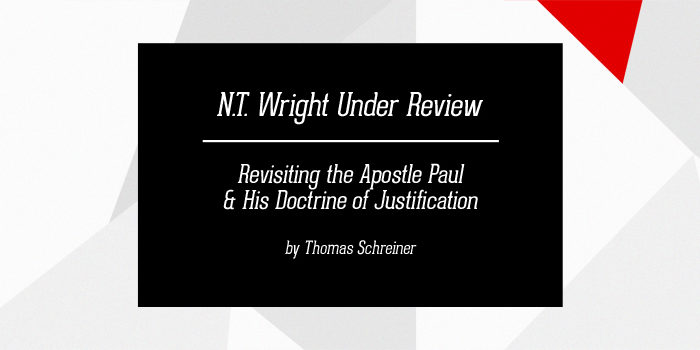
N. T. Wright Under Review – Revisiting the apostle Paul and his doctrine of Justification (Thomas Schreiner)
In the new issue of Credo Magazine, “Justification: The Doctrine On Which the Church Stands or Falls,” Thomas Schreiner has contributed a review article titled, “N. T. Wright Under Review Revisiting the apostle Paul and his doctrine of Justification.” Thomas Schreiner is James Buchanan Harrison Professor of New Testament at The Southern Baptist Theological Seminary. Among his many books are Romans, Paul, Apostle of God’s Glory in Christ: A Pauline Theology, New Testament Theology: Magnifying God in Christ, Magnifying God in Christ: A Summary of New Testament Theology, and Galatians. Schreiner is also a regular contributor to Credo Magazine.
Schreiner begins:
In this two volume work, Paul and the Faithfulness of God (Fortress, 2013), N. T. Wright continues his multi-volume work on Christian Origins and the Question of God. His work on Paul is very long (probably too long), consisting of two volumes. Even though this review article is somewhat lengthy, I am not claiming to represent fully what Wright says in this mammoth work, and what is emphasized represents to some extent my own interests. Still, before evaluating what Wright says, I will spend some time summarizing the contents of the book with the hope that his book gets a fair hearing.
The book is divided into four parts: Wright begins by exploring the religious, social, political, and cultural world in which Paul lived (chaps. 1-5). He then investigates the worldview of Paul, focusing on symbol and praxis (chaps. 6-8). The third part zeros in on Paul’s theology under the themes of monotheism, election, and eschatology (chaps. 9-11). Finally, he considers how Paul’s theology interfaces with both the Greco-Roman and Jewish world of his day (chaps. 12-15). The last chapter discusses Paul’s aims and intentions (chap. 16).
Another word about the plan of the book might prove helpful. Wright’s treatment of Paul’s worldview (chaps. 6-8) precedes the explication of his theology (chaps. 9-11), since Wright believes that Paul’s theology flows from his worldview. In addition, chaps. 12-15 return to the discussion of the historical, cultural, social, and religious world discussed in chaps. 2-5. In these final chapters Wright unpacks (now that he has explained Paul’s theology) how Paul’s theology relates to its first century context. Wright’s work, then, is earthed in history. He has no patience for those who attempt to do Pauline theology apart from the historical context of the day.
Read the rest of Schreiner’s review today!
Justification: The Doctrine on which the Church Stands or Falls
While we could point to many different factors that led the sixteenth century Protestant Reformers to break from Rome, perhaps one that would be at the very top of the list is the doctrine of justification by faith alone. For Luther and Calvin, this doctrine is the very hinge on which the Christian religion turns. In part this is because sola fide is what sets Protestants apart. While every other religion puts something of man into the equation, Protestantism removes man’s works from the justification formula altogether. Therefore, the “sola” in sola fide makes all the difference in the world.
With over 2,000 years of church history in our rear view mirror, it appears that sola fide is a doctrine that comes under discussion in every generation. Our generation is no exception. Much dialogue continues over the New Perspective on Paul, Protestant and Catholic statements of agreement, and the relationship between justification and the Christian life. In this issue I am proud to welcome some of the finest thinkers on the subject in order to better understand what Scripture says about how sinners can be made right with a holy God.
Contributors include Thomas Schreiner, Michael Allen, Michael Horton, Philip Ryken, J.V. Fesko, Matthew Barrett, Korey Maas, Guy Waters, Brian Vickers, Fred Zaspel, and many others.

